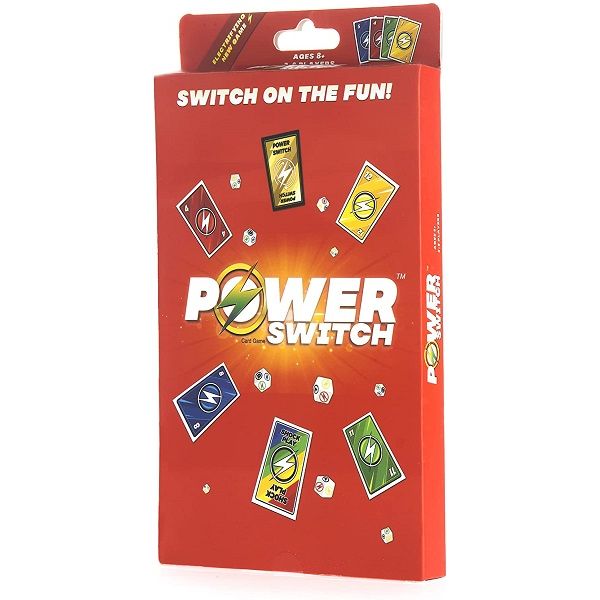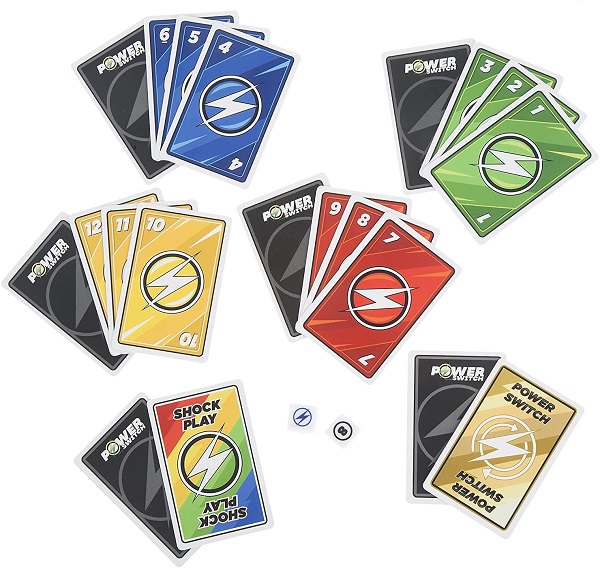Build the Power Line, Avoid Points, and Play All Your Cards in Power Switch

A light, fast, and casual card game about playing all your cards and trying to win with the lowest number of points. The round ends once a player places their last card, and all cards left in your hand then score. So how does it play?
Gameplay
The deck of cards is shuffled and cards equal to the number of players are dealt face-down to form the generator pile, then the rest of the cards are dealt out evenly between all players to form their hands. Cards come in four different colors, numbered one through twelve. In addition, there are also shock play cards in the deck (the number varies from one to three based on player count). Each player also is given one power switch card which they place in front of themselves, face-up.
Next, the two dice are rolled. They will give you a number and a color of the starting power card. Sometimes the result will allow the dealer or the player who currently has the highest score to choose a color. The player with the starting power card then announces it and places it face-up on the table to form a horizontal row. If the starting power card is in the generator pile, then players must take turns drawing a card from the pile until someone draws it.
Players then take turns. On your turn you may either add to a power tower or build the power line. When adding to a tower, you play a card off of one of the horizontal cards currently on the table. It must match the color you are playing off of. If you play it above the card it must be one number higher than either the horizontal card or the card previously played above that card, and if you play it below the horizontal card then it must be one number lower. When adding to the power line, you play another color card whose number is equal to the starting power card, placing it also horizontally. Shock play cards are wild and can be played in place of any other card when building a tower, but cannot be used for building the power line.
If you cannot make a legal play, you must draw a card from the generator pile. If you can then play that card, you do so; otherwise you add it to your hand and your turn ends. If the generator pile is depleted, then the player to your right chooses a card from his hand to pass to you instead.
Once per game, you may use your power switch card. This allows you to swap hands with any other player. Only one power switch card can be played each round.
The round ends once a player plays her last card. All remaining players then add up the total points of the cards left in their hands. Cards with a value of one to six are worth five points, and seven through twelve are ten points each. A card replaced by a shock play card in a power tower, is worth fifty points. You then reset the game for another round. The game ends once someone reaches three hundred points (or another agreed upon score) and the player with the fewest points wins the game.

Review
Power Switch is a fairly simple game of playing cards when you have the right number and color in your hand. But players do have some control over when they start new paths on the power line or which towers to add, keeping in mind the options that will open for other players and what cards are still in their own hands.
You also have to choose carefully which cards to pass when the generator pile runs out or when to use your precious power switch card at the most optimal time. Does a player with a low score have a small hand and you’ve got a lot of points in your own? Do you think you can win the round by taking another player’s cards?
Turns are fast and down time is minimal. The game play is best at three players and up. The game is quite fast to teach and a lot of the gameplay is intuitive. The cards are nicely made, the dice enjoyable enough to roll, and it all comes packed in a thin box that makes the game quite easy to travel with.
Power Switch isn’t a game for those looking for lots of strategy, as it is heavily luck-based. But the simplicity, with that extra bit of decision making, makes this a good fit for family gatherings with people who don’t play many games, and the flexible player count is also a benefit.
Pros: Flexible player count, travel-friendly, fast turns
Cons: Not at its best with two players, too much luck of the draw for some players
Disclosure: we received a complimentary review copy of this game.







